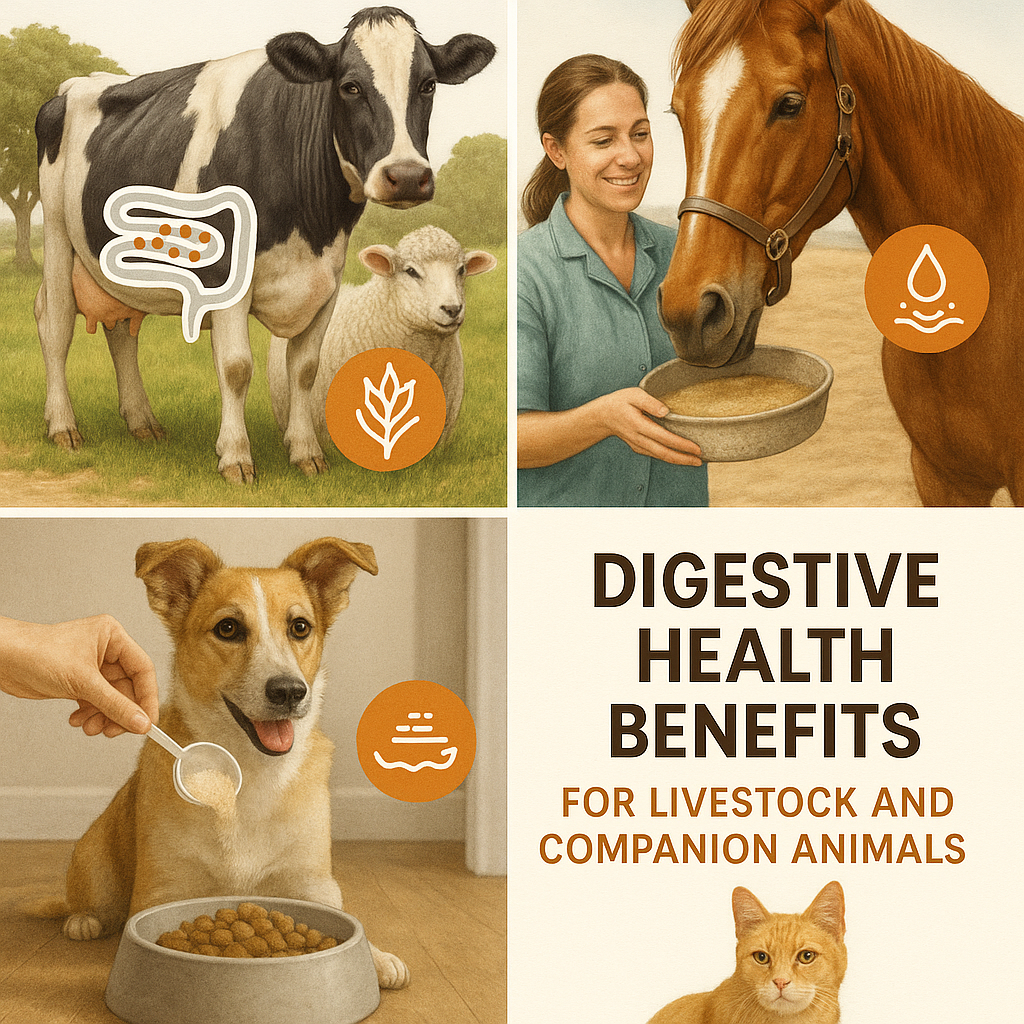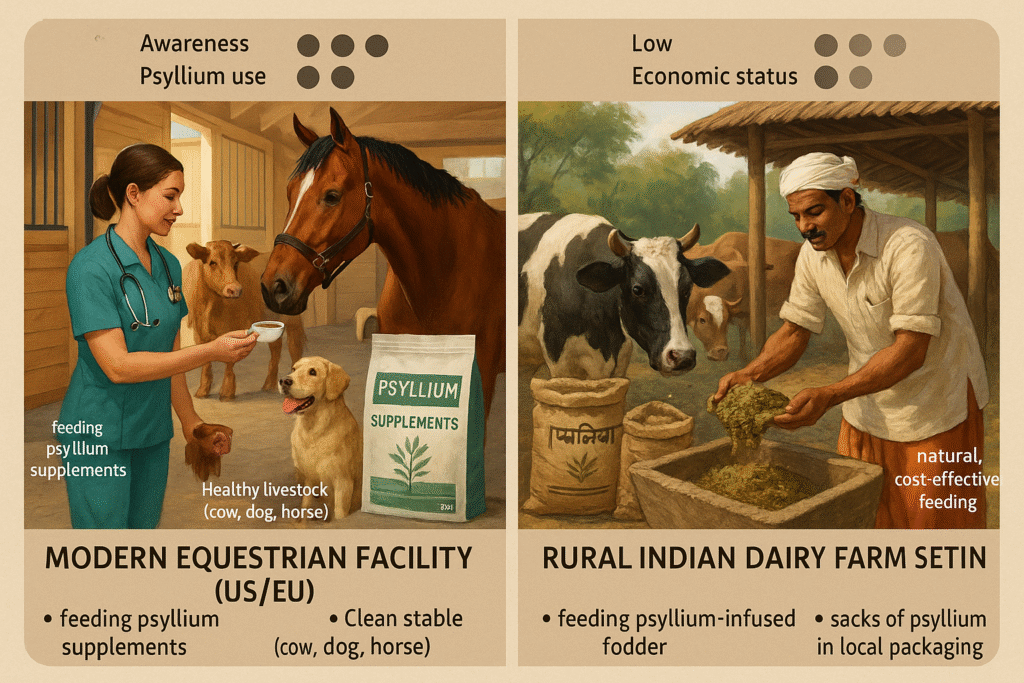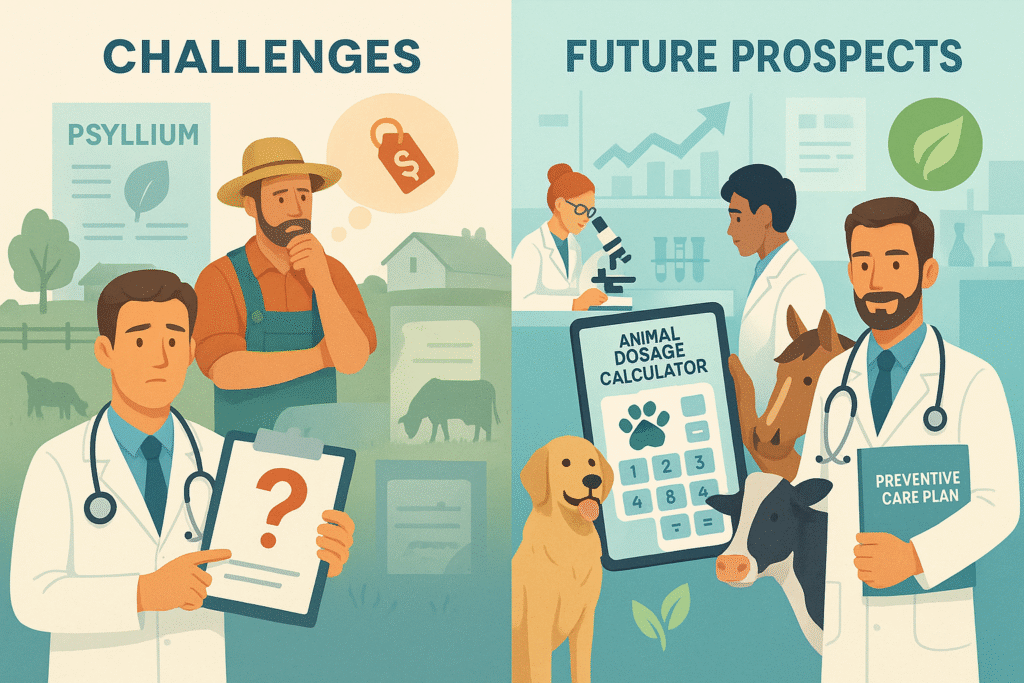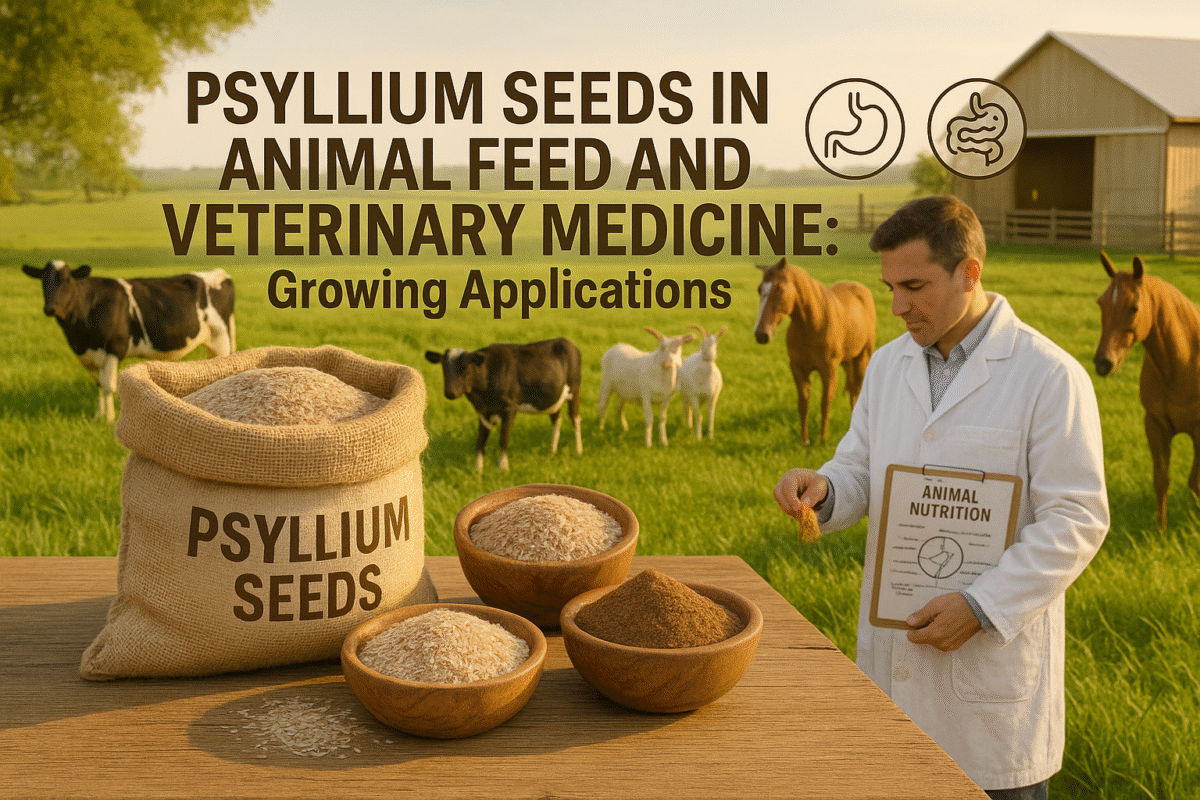Table of Contents
Psyllium Seeds and Their Nutritional Profile
Psyllium seeds, derived from the plant Plantago ovata, have gained significant attention in both human health and animal care due to their exceptional fiber content and digestive benefits. Native to the Indian subcontinent, psyllium has been used for centuries, primarily for its medicinal properties, particularly in managing constipation. In recent years, however, its role in animal feed and veterinary medicine has been explored, with growing evidence supporting its inclusion as a valuable addition to animal diets.
The nutritional profile of psyllium seeds is dominated by soluble fiber, which constitutes the majority of its content. This soluble fiber is primarily found in the form of the husk, a byproduct of the seeds, which is where the majority of its digestive benefits are derived. Psyllium seeds are available in various forms, such as whole seeds, husks, and ground powder, making them versatile in both human and animal diets. The husk is particularly prized for its high mucilage content, which absorbs water and forms a gel-like substance when mixed with liquids. This property makes psyllium an excellent ingredient in managing digestive issues, not only in humans but also in animals.
The appeal of psyllium in animal diets is due to its ability to support healthy digestion. For livestock such as cattle, sheep, and goats, psyllium provides fiber to improve gut motility, while in companion animals like dogs and horses, it helps manage bowel regularity and overall digestive health. Additionally, psyllium serves as a natural source of prebiotics, which contribute to a balanced gut microbiota, further enhancing its digestive benefits.
Digestive Health Benefits for Livestock and Companion Animals

Veterinary Applications: Natural Remedy for Sand Impaction and Colic
In veterinary medicine, one of the most well-known uses of psyllium is for the treatment of sand colic in horses. Sand colic occurs when horses ingest sand or dirt while grazing, which can accumulate in the colon, leading to painful impactions and colic. Left untreated, this condition can lead to severe discomfort, dehydration, and even death. Psyllium works as a natural, non-invasive remedy by absorbing the sand and water, forming a gel-like substance that helps to flush the sand from the digestive tract.
Psyllium’s role in preventing and treating sand colic is particularly important in areas where horses are kept in sandy environments or are prone to eating non-food items. Veterinarians often recommend psyllium supplementation as part of a routine management plan for horses living in such conditions. The effectiveness of psyllium in managing sand colic has made it a widely accepted treatment for this condition, with many horse owners incorporating it into their animals’ diets as a preventive measure.
Beyond sand colic, psyllium is also used to treat other gastrointestinal issues in various animals. In cattle, psyllium can help alleviate digestive disorders related to poor motility or irregular feeding schedules. In small companion animals, psyllium can be used to treat diarrhea or constipation, helping to stabilize their digestive systems without the need for harsh pharmaceutical treatments.
Integration in Commercial Animal Feed Formulations
Psyllium’s growing popularity in the animal feed industry has led to its integration into commercial feed formulations, especially in sectors like poultry, dairy, and pet food. In poultry, psyllium is used to improve gut health, helping birds maintain regular bowel movements and preventing the occurrence of intestinal blockages. This is particularly useful in broiler chickens, which are often subject to fast growth rates and can suffer from digestive issues due to the rapid processing of food.
For dairy cattle, psyllium serves as an excellent source of fiber to support digestion and promote overall gut health. Incorporating psyllium into their diet helps improve milk production by ensuring the proper functioning of the digestive system. The fiber helps cattle process their food more efficiently, leading to better nutrient absorption and overall health.
Psyllium is also gaining traction in the pet food industry, particularly for dogs and cats with digestive issues. By adding psyllium to pet food formulations, manufacturers are able to offer a natural solution to common gastrointestinal problems, including constipation and diarrhea. Pet food brands are increasingly incorporating psyllium as a functional ingredient that supports digestive health, making it an attractive option for health-conscious pet owners.
Psyllium as a Functional Fiber in Preventive Veterinary Nutrition
Preventive veterinary nutrition focuses on maintaining the overall health and well-being of animals by managing potential health risks before they become serious conditions. Psyllium’s high fiber content makes it an excellent choice for this purpose, particularly in the prevention of digestive disorders. Regular supplementation with psyllium can help reduce the risks of conditions like constipation, colic, and other gastrointestinal issues, which are common in both livestock and companion animals.
In addition to promoting digestive health, psyllium also acts as a prebiotic, supporting the growth of beneficial gut bacteria. A healthy gut microbiome is essential for optimal digestion and immune function, making psyllium a valuable addition to any animal’s diet. Preventive care with psyllium can reduce the need for pharmaceutical interventions, leading to more natural, sustainable veterinary practices.
Comparative Usage in Developed vs. Developing Countries

In the U.S., psyllium is widely recommended by veterinarians for horses living in sandy environments or those prone to digestive issues. The growing awareness of its natural, non-invasive properties has led to its inclusion in the diets of not just horses but also dogs and livestock. The trend is also visible in European countries, where psyllium is used to promote gastrointestinal health in a variety of animals, from dairy cows to companion pets.
In developing countries, particularly in regions like India, psyllium’s use is more closely linked to the dairy cattle industry. India, being one of the largest producers of psyllium, has adopted its use primarily as a digestive aid for cattle. Dairy farmers use psyllium to maintain healthy digestion in their herds, with an emphasis on improving milk production and preventing digestive disorders. The affordability and accessibility of psyllium make it an attractive option for farmers in developing countries who are seeking natural and cost-effective solutions to enhance livestock health.
The differences in adoption rates between developed and developing nations are influenced by various factors, such as the availability of psyllium, awareness of its benefits, and the economic status of the agricultural sectors. In developed countries, there is a stronger push towards animal health and wellness, with a higher willingness to invest in specialized feed additives. In contrast, developing nations often rely more on traditional methods and may be slower to adopt newer supplements like psyllium, despite its potential benefits.
Regulatory Status and Quality Standards Across Key Markets
The regulatory landscape surrounding the use of psyllium in animal feed is an important factor that influences its adoption and integration into veterinary medicine. Different countries have varying standards and regulations regarding the inclusion of psyllium in animal diets. These regulations ensure the safety, quality, and efficacy of psyllium-based products for animal consumption.
In the United States, the Food and Drug Administration (FDA) oversees the safety of animal feed ingredients, including psyllium. Psyllium is considered Generally Recognized as Safe (GRAS) for use in animal feed, provided it meets certain quality standards and is used according to recommended dosages. The FDA’s oversight ensures that psyllium products are free from contaminants and are safe for consumption by animals, thereby protecting both animal health and the food supply.
In the European Union, the European Food Safety Authority (EFSA) regulates the use of feed additives, including psyllium. EFSA conducts scientific assessments to determine the safety and nutritional benefits of psyllium in animal diets. Once a product is approved, it must adhere to strict guidelines regarding its composition and labeling. The EFSA’s role is crucial in maintaining the high standards of animal feed and ensuring that psyllium is used in a way that supports both animal welfare and public health.
In India, the Food Safety and Standards Authority of India (FSSAI) sets the standards for food and feed ingredients. While psyllium is widely used in animal feed in India, the regulatory framework surrounding its use is still developing. As the demand for natural feed additives grows, Indian authorities are working towards establishing clearer guidelines to ensure the safe and effective use of psyllium in animal diets.
These regulatory bodies ensure that psyllium-based feed products are properly assessed and monitored, which is essential for maintaining animal health and preventing any potential adverse effects. Compliance with these regulations is crucial for manufacturers who wish to export psyllium-based products to different markets, as they must adhere to the specific standards set by each country’s regulatory agencies.
Sustainability and Organic Farming Trends Boosting Psyllium Use
As the demand for sustainable and organic farming practices continues to grow, psyllium has found its place as a favored ingredient in animal feed. The rise of clean-label products, which prioritize natural and minimally processed ingredients, has further increased the appeal of psyllium among animal feed manufacturers. Psyllium, being a natural and renewable plant-based fiber, aligns well with the goals of sustainability and eco-conscious farming.
In organic farming, psyllium is often used as a fiber source to maintain digestive health in livestock and pets without the need for synthetic additives. Its use in organic animal feed is especially important for farmers who aim to reduce their reliance on chemical fertilizers and pesticides. Psyllium is also a valuable addition to organic pet foods, as it provides a natural source of fiber while supporting gut health without the use of artificial preservatives or additives.
The sustainability of psyllium cultivation also plays a significant role in its growing use in animal feed. Psyllium is a drought-resistant crop that thrives in arid regions, making it an ideal choice for farmers looking to grow a sustainable crop in regions with water scarcity. Additionally, the plant’s ability to improve soil health by reducing erosion makes it a beneficial crop for soil conservation, further enhancing its appeal among eco-conscious farmers.
As organic farming practices continue to gain momentum worldwide, psyllium’s role as a sustainable and natural ingredient in animal feed is expected to expand. Its inclusion in clean-label products helps meet the growing consumer demand for transparency and ethical farming practices, aligning with the broader trend towards sustainable and responsible food production.
Market Demand and Export Opportunities for Psyllium in Veterinary Use
The global demand for psyllium in veterinary use has been steadily increasing, with key markets emerging in North America, Europe, and Asia. The rising awareness of digestive health among pet owners, livestock farmers, and equine enthusiasts is driving the demand for psyllium-based products. As the market for psyllium continues to expand, there are significant export opportunities for producers and suppliers.
The United States and European Union remain the largest markets for psyllium-based veterinary products, with increasing interest in both equine health and pet care. In the U.S., psyllium is commonly used to support gut health in horses and pets, and its popularity in the equine industry has opened up export opportunities for suppliers. Similarly, in the EU, the demand for natural feed additives and digestive health supplements has created a strong market for psyllium-based products.
In Asia, particularly in India, psyllium is an essential part of the dairy cattle industry, and its demand is growing steadily. Indian producers are exploring opportunities to export psyllium to other countries, especially in the Middle East, Southeast Asia, and even Western markets. As the demand for high-quality, natural animal feed ingredients continues to rise, psyllium producers are positioning themselves to meet this growing need.
Export opportunities for psyllium-based products are not limited to developed countries. Emerging markets in Africa and Latin America also represent untapped potential for the sale of psyllium in veterinary applications. As the global market for natural and functional ingredients expands, suppliers who can meet the demand for high-quality psyllium and navigate the complexities of international trade will stand to benefit from substantial growth in this sector.
Challenges and Future Prospects in Veterinary Psyllium Applications

Another challenge is the lack of widespread awareness regarding the benefits of psyllium in animal health. While many veterinarians and farmers are familiar with its use, there remains a knowledge gap in certain regions and sectors. Greater education and awareness campaigns are needed to promote the use of psyllium in animal feed, especially in developing countries where its potential benefits may not be as well recognized.
Cost is another significant barrier to the broader adoption of psyllium in animal feed. While psyllium is generally affordable, it can still be considered an additional cost for farmers who are already dealing with tight margins. However, as research into psyllium’s benefits expands and more cost-effective production methods are developed, its affordability and accessibility should improve.
Looking to the future, the potential for psyllium in veterinary medicine and animal feed is vast. With continued research and innovation, psyllium could be further integrated into preventive care strategies for a variety of animal species. As more data becomes available, the role of psyllium in maintaining optimal health and preventing digestive disorders in animals will become even more widely acknowledged.



